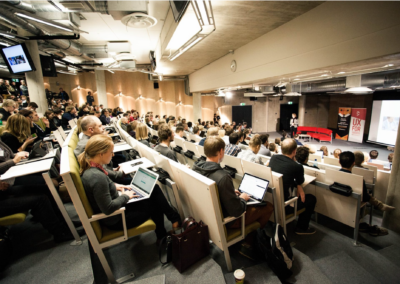ECCE 2025 – Critical reflection for a better tomorrow
7–10 October 2025 Tallinn, Estonia
The European Conference on Cognitive Ergonomics (ECCE), established in 1982, is the premier annual conference of the European Association of Cognitive Ergonomics (EACE). It serves as a platform for researchers, practitioners, and academics to share advancements, ideas, and discussions in the fields of cognitive ergonomics and human-media interaction. ECCE is organized in cooperation with ACM SIGCHI.
For 2025, ECCE will take place in Tallinn, a city renowned for its innovation, advanced e-services, and commitment to forward-thinking digital public solutions, making it the perfect setting for this year’s theme: “Critical reflection for a better tomorrow.”
Our goal is to raise awareness of the role and contribution of cognitive ergonomics and related design-oriented fields in enabling the experiences of individuals, communities, and the whole society through the experiences we enable, facilitate or craft.
ECCE 2025 invites original work moving the fields of cognitive ergonomics and human-media interaction forward, be it through the advances of theory, methodology, or through practice.
Main submission deadlines are:
31 March 2025
Papers (long and short), Panels, Workshops
28 April 2025
Papers (work in progress), Doctoral Consortium
28 April 2025
Notifications about Panels and Workshops
26 May 2025
Notifications about all other types of contributions
Call for Papers
ECCE 2025 is open to several types of contributions: papers (long, short, work-in-progress), posters, panels and workshops. We invite contributions of high international standard, presenting original work that significantly contributes to research and practice of cognitive ergonomics and human-media interaction in its broadest sense.
We especially welcome submissions aligned with the conference theme:
- Sustainability
- Participatory design
- Frugal design
- Low-tech design
- Design methods, tools, and methodologies for designing sustainable interactive systems
- Ecological approaches to human cognition and human-technology interaction
- Ethical issues in digital environments
- Work analysis
- Human-computer interaction
- Human-environment interaction
- User experience design
- User research concepts, methods, and empirical studies
- Cognitive processes in design
- Cognitively-orientated human factors
- Perception, emotion, cognition
- Mixed, augmented, and virtual realities
- Computer-Supported Cooperative Work
- Human-centred AI
- Teaching Cognitive Ergonomics and Human-Computer Interaction
- Safety and reliability of work
Venue
The ECCE 2025 conference will take place at Tallinn University, located in the heart of Tallinn, Estonia. Tallinn University is renowned for its academic excellence and commitment to fostering innovation and sustainability, making it an ideal host for this year’s conference.

Location Highlights
- Situated near Tallinn’s historic Old Town, a UNESCO World Heritage Site.
- Easy access to public transportation, hotels, and cultural attractions.
- A modern campus offering state-of-the-art facilities for conferences and events.
Further details about accommodation options, transportation, and local attractions will be shared soon to help you plan your visit.
For questions related to the venue, please contact us at ecce2025@tlu.ee
Supporters and Sponsors








